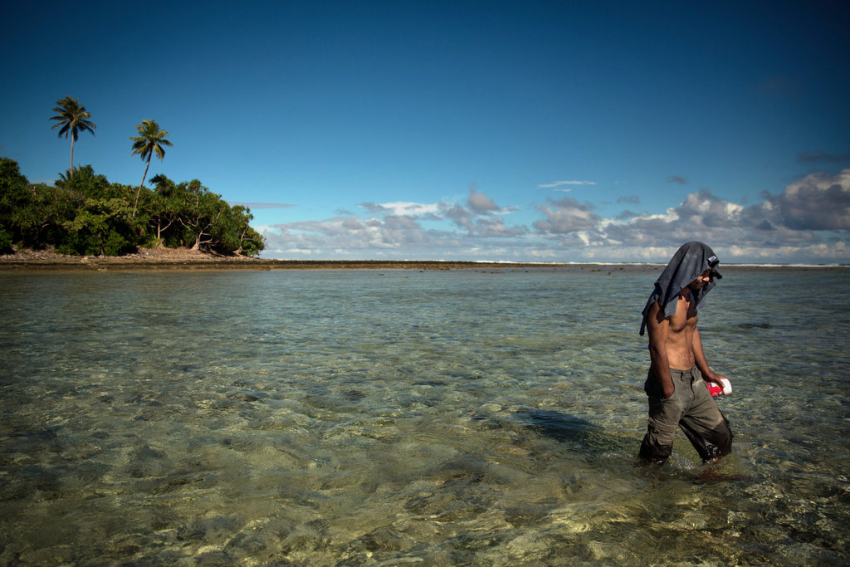EBEYE, MARSHALL ISLANDS (Web Desk) – The Marshall Islands are fast disappearing from the wold map due to rising seas, putting the nation at risk.
Many nations met in Paris to thrash out policies for coping with climate change but still Linber Anej wades out in low tide to haul concrete chunks and metal scraps to shore and rebuild the makeshift sea wall in front of his home.
The temporary barrier is no match for the rising seas that regularly flood the shacks and muddy streets with saltwater and raw sewage, but every day except Sunday, Mr. Anej joins a group of men and boys to haul the flotsam back into place.
“It’s insane, I know,” said Mr. Anej, 30, who lives with his family of 13, including his parents, siblings and children, in a four-room house. “But it’s the only option we’ve got.”
Standing near his house at the edge of a densely packed slum of tin shacks, he said, “I feel like we’re living underwater.”
Worlds away, in plush hotel conference rooms in Paris, London, New York and Washington, Tony A. deBrum, the foreign minister of the Marshall Islands, tells the stories of men like Mr Anej to convey to more powerful policy makers the peril facing his island nation in the Pacific as sea levels rise — and to shape the legal and financial terms of a major United Nations climate change accord now being negotiated in Paris.
Mr. deBrum’s focus is squarely on the West’s wallets — recouping “loss and damage,” in negotiators’ parlance, for the destruction wrought by the rich nations’ industrial might on the global environment.
Many other low-lying nations are just as threatened by rising seas. In Bangladesh, some 17 percent of the land could be inundated by 2050, displacing about 18 million people.
But the Marshall Islands holds an important card: Under a 1986 compact, the roughly 70,000 residents of the Marshalls, because of their long military ties to Washington, are free to emigrate to the United States, a pass that will become more enticing as the water rises on the islands’ shores.
The debate over loss and damage has been intense because the final language of the Paris accord could require developed countries, first and foremost the United States, to give billions of dollars to vulnerable countries like the Marshall Islands.
Senior Republicans in Congress are already preparing for a fight, they say on behalf of the American taxpayer.
“Our constituents are worried that the pledges you are committing the United States to will strengthen foreign economies at the expense of American workers,” 37 Republican senators wrote last month.
“They are also skeptical about sending billions of their hard-earned dollars to government officials from developing nations.”
“It does not make sense for us to go to Paris and come back with something that says, ‘In a few years’ time, your country is going to be underwater,’” Mr. deBrum said in an interview at his seaside home in Majuro, the capital of the Marshall Islands.
“We see the damage occurring now. We’re trying to beat back the sea.”
In the global fight over climate change, leaders of vulnerable low-lying island nations have long sought to draw attention to their plight.
They have staged symbolic events like an underwater cabinet meeting, gone on hunger strikes and delivered anguished speeches to the United Nations.
Those efforts have had little impact on the substance of the energy and economic policies that dictate governmental response to climate change.
Courtesy: New York Times
















